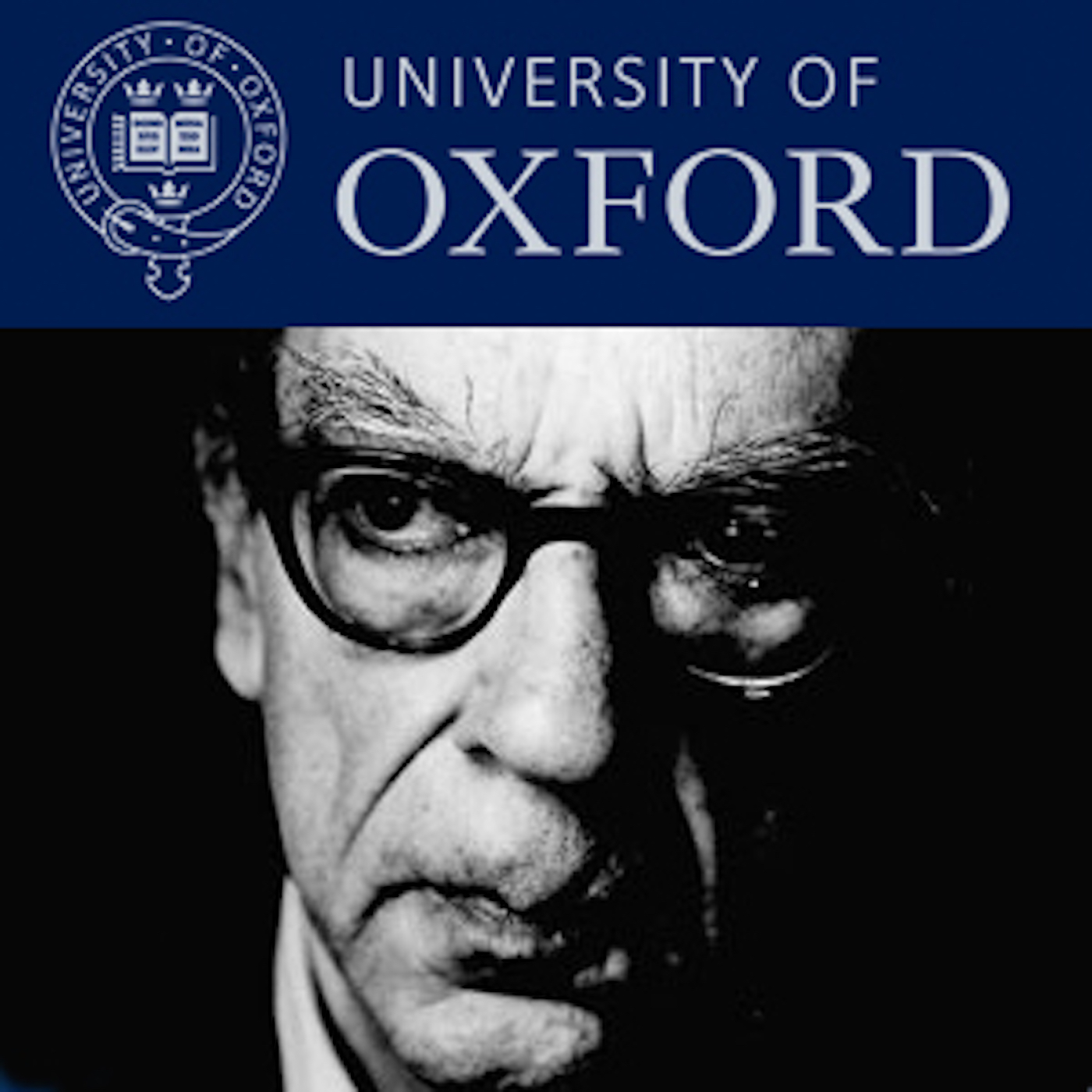

Isaiah Berlin
Oxford University
Isaiah Berlin (1909–1997), founding President of Wolfson College, University of Oxford, is regarded as one of the leading thinkers of the twentieth century. He was famous as an extempore lecturer, and his inimitable speaking style is well illustrated in this series of podcasts.
Episodes
Mentioned books

May 23, 2014 • 13min
Anna Akhmatova reading her poems about Isaiah Berlin in Oxford in 1965
This podcast is in Russian. This short recording includes 'Cinque' and other poems inspired by the poet's meetings with Isaiah Berlin. The celebrated Russian poet Anna Akhmatova came to Oxford at Isaiah Berlin's instigation in June 1965, a year before her death, to receive an honorary DLitt. In this short recording, made at New College, Oxford, during her visit, she reads a number of her poems (in the original Russian). Some of them were inspired by Berlin's visits to her in Leningrad in 1945–6. For IB's recollections of these visits see his 'Meetings with Russian Writers in 1945 and 1956' in his 'Personal Impressions' (3rd edition, 2014, pp. 356-432).
The poems are:
1. 'It is stingy, and rich' (1910s): «И скупо оно и богато ...»
2. 'Another Song' (1956), from 'Sweetbriar in Blossom': «Как сияло, так и пело ...»
3. 'You demand poems from me bluntly ...' (1962), from 'Sweetbriar in Blossom': «Ты стихи мои требуешь прямо ...»
4. From 'Prologue, or Dream within a Dream', from the play 'Enuma Elish' (1960s): Из пьесы «Пролог или Сон во Сне»
5. The complete cycle of five poems, 'Cinque' (1945–6), written immediately after meeting Berlin; Akhmatova wrote no. 2 down for Berlin in a presentation copy of her 'From Six Books' (1940) – see preview image
«Как у облака на краю ...»
«Истлевают звуки в эфире ...»
«Я не любила с давних дней ...»
«Знаешь сам, что не стану славит ...»
«Не дышали мы сонными маками ...»
6. 'We thought: we are beggars ...' (1915): «Думали: нищие мы, нету у нас ничего ...»
7. 'Verses about St Petersburg' (1913):
«Вновь Исакий в облаченье ...»
«Сердце бьется гулко, мерно ...»
8. 'Ah, for you Russian is not enough ...' (1962): «А тебе еще мало по-русски ...»

Jul 31, 2013 • 1h 4min
The Origins of Cultural History: 1 – Two Notions of the History of Culture: The German versus the French Tradition
Isaiah Berlin gives the first of his Gauss Seminars at Princeton University on 'The Origins of Cultural History', 19 February 1973 Transcript at: https://berlin.wolf.ox.ac.uk/lists/nachlass/origins1.pdf Transcript at: https://isaiah-berlin.wolfson.ox.ac.uk/catalogues

Jul 31, 2013 • 1h 7min
The Origins of Cultural History: 2 – Geisteswissenschaft and the Natural Sciences: Vico versus Descartes
Isaiah Berlin gives the second of his three Gauss Seminars at Princeton University on 'The Origins of Cultural History', 20 February 1973 Transcript at https://berlin.wolf.ox.ac.uk/lists/nachlass/origins2.pdf Transcript at: https://isaiah-berlin.wolfson.ox.ac.uk/catalogues

Jul 31, 2013 • 1h 14min
The Origins of Cultural History: 3 – The Origins of the Conflict: Political Lawyers, Classical Scholars, Narrative Historians
Isaiah Berlin gives the third of his three Gauss Seminars at Princeton University on 'The Origins of Cultural History', 22 February 1973 Transcript at https://berlin.wolf.ox.ac.uk/lists/nachlass/origins3.pdf and https://isaiah-berlin.wolfson.ox.ac.uk/catalogues

Jul 31, 2013 • 1h 1min
Two Enemies of the Enlightenment: 3 – Joseph de Maistre
Isaiah Berlin gives the third of his four Woodbridge Lectures at Columbia University, New York, 27 October 1965 Transcript at https://berlin.wolf.ox.ac.uk/lists/nachlass/maistre.pdf. Recordings have been found only of the second and third lectures.

Jul 31, 2013 • 56min
Two Enemies of the Enlightenment: 2 – J. G. Hamann
Isaiah Berlin gives the second of his four Woodbridge Lectures at Columbia University, New York, 26 October 1965 Transcript at https://berlin.wolf.ox.ac.uk/lists/nachlass/hamann.pdf. Recordings have been found only of the second and third lectures.

9 snips
Jun 3, 2009 • 57min
A Very Personal Impression: Isaiah Berlin
This talk was given at Wolfson College on 28 May 2009 as part of the 'Lives and Works' series of lectures

Apr 15, 2009 • 1h 2min
From Communism to Zionism: Moses Hess (1957)
1957 Lucien Wolf Memorial Lecture. Lecture on the Jewish philosopher Moses Hess, one of the founders of Zionism and a committed Socialist. Berlin also discusses Hess’s evolution as a philosopher, from International Socialism to Zionism. Published in Berlin's collection 'Against the Current' (1979; 2nd ed. 2013)

Apr 15, 2009 • 30min
A Fire at Sea (1957)
The podcast explores the dramatic events of the Russian steamer Nicholas I catching fire, featuring Ivan Turgenev. It delves into intriguing tales of bribery and false accusations at sea, intertwining the fears of historical figures. The focus shifts to a man's struggles with weakness and moderation, his defense against ridicule in literature. A tale of youth and temptation unfolds on a steamer ship, revealing beginner's luck amidst charm and psychological intrigue. Passengers face a chaotic fire at sea, showcasing extreme behaviors and a daring rescue attempt amidst the flames.

Apr 15, 2009 • 41min
Alexander Herzen: His Opinions and Character (1955)
A deep dive into Alexander Herzen's beliefs in liberty, his disdain for radicalism in Russia, and his impact on society. The podcast explores his rebellious nature, the balance between objectivity and passion in creating content, and contrasts in national identities. It also analyzes Herzen's dialogue with Roy Blond and Tugenev's approach, highlighting the complexities of revolutionary passions and the preservation of civilization.


